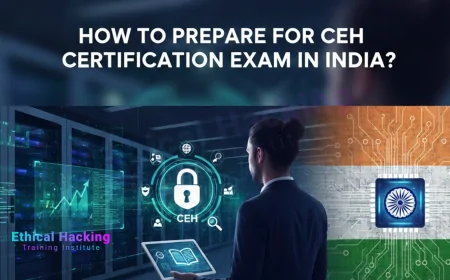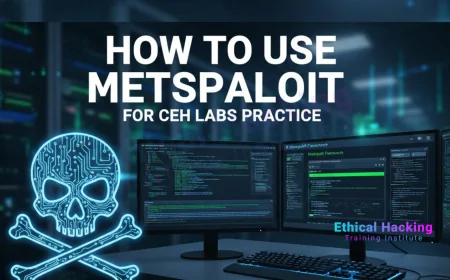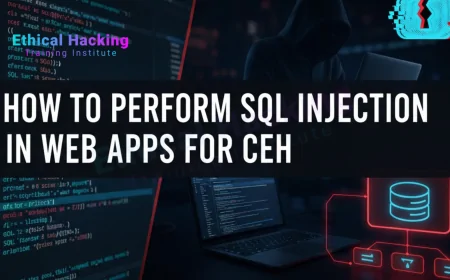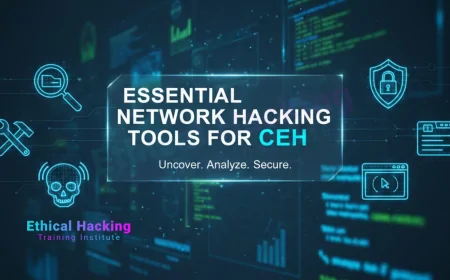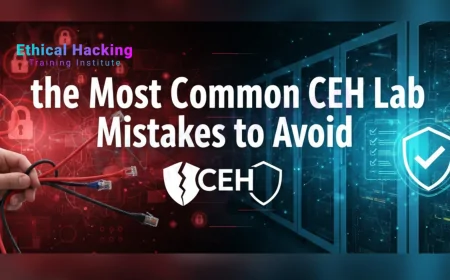EC Council Certified Ethical Hacker: A Pathway to Becoming a Cybersecurity Expert | Start Your Cybersecurity Journey with EC-Council’s CEH Certification
Learn how the EC Council Certified Ethical Hacker (CEH) certification can launch your cybersecurity career. Explore syllabus, tools, skills, career roles, and expert-level pathways.
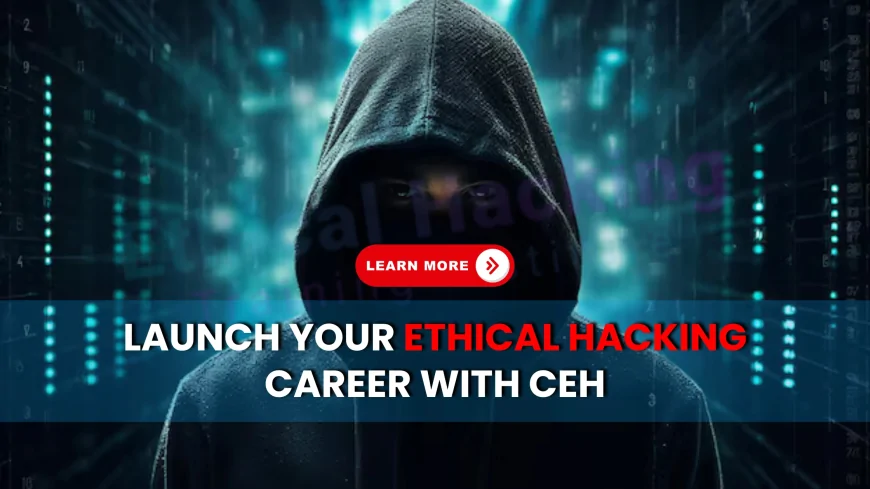
Table of Contents
- Introduction
- What Is the CEH Certification?
- Why CEH Matters in Cybersecurity
- CEH Curriculum & Core Modules
- Key Skills You’ll Gain
- Tools & Hands‑On Labs
- Training Delivery Formats
- Exam Structure & Preparation
- Career Impact & Roles
- Global Recognition & Standards
- Pathway to Expert-Level Certifications
- Choosing a CEH Training Provider
- Cost, Value & ROI
- What Comes After CEH?
- FAQs
- Conclusion
Introduction
The EC Council Certified Ethical Hacker (CEH) certification is a globally recognized entry point into the cybersecurity world. Designed to build offensive security proficiency, CEH equips learners with practical hacking techniques and analytical expertise, setting them on a path toward becoming cybersecurity experts.
What Is the CEH Certification?
CEH is a certification from the EC Council that validates your skills in penetration testing, vulnerability assessment, and network security. You learn the same methods criminals use, but apply them ethically to protect organizations from breaches.
Why CEH Matters in Cybersecurity
- **Ethical perspective: Understand how hackers operate to secure networks before they’re breached.
- **Industry Credibility:** Trusted by governments, enterprises, and security teams worldwide.
- **Compliance Advantage:** Supports ISO 27001, GDPR, PCI-DSS, and other standards.
- **Career Demand:** Opens roles such as Ethical Hacker, Penetration Tester, Security Analyst.
CEH Curriculum & Core Modules
The CEH syllabus spans 20+ modules:
- Footprinting & Reconnaissance
- Network Scanning & Enumeration
- System Hacking & Privilege Escalation
- Malware Threats
- Sniffing & Packet Analysis
- Social Engineering
- Web App Hacking & SQL Injection
- Wireless & Mobile Platform Hacking
- Cloud & IoT Security
- Cryptography & Penetration Testing Methodologies
Key Skills You’ll Gain
- Penetration testing from reconnaissance to reporting
- Identifying and exploiting vulnerabilities
- Advanced social engineering tactics
- Secure coding practices and web app defenses
- Wireless, IoT, and cloud security testing techniques
Tools & Hands‑On Labs
CEH includes immersive labs using platforms such as EC-Council iLabs. You’ll master tools like:
- Nmap, Metasploit, Burp Suite, Wireshark, Aircrack‑ng, John the Ripper
Training Delivery Formats
- Self-paced online with recorded modules and labs
- Live instructor-led virtual classes
- Classroom/bootcamp immersive training
- Hybrid blended format
Exam Structure & Preparation
- 125 MCQs over 4 hours
- Passing score: 60–85%, varies by exam
- Training includes mock tests, quizzes, and exam blueprints
Career Impact & Roles
Upon certification, you become qualified for:
- Penetration Tester
- Security Consultant
- Security Analyst/Engineer
- Vulnerability Assessor
Salary range in India: ₹6–20 LPA; globally, ₹30 LPA+ for mid-career professionals.
Global Recognition & Standards
CEH is accredited by ANSI, recognized by the NSA, and aligned with global cybersecurity frameworks. It’s approved in many government and critical infrastructure sectors.
Pathway to Expert-Level Certifications
After CEH, advanced credentials include:
- CEH (Practical)
- ECSA, OSCP, LPT (Licensed Penetration Tester)
- CHFI, CISSP, CISM
Choosing a CEH Training Provider
- EC‑Council accreditation is non-negotiable
- Lab depth and tool access are key
- Instructor background in real-world security
- Exam voucher and retake policies
- Post-certification mentorship and community
Cost, Value & ROI
In India, training packages range ₹30,000–₹75,000; global programs are $1,500–$3,000. ROI includes higher salaries, consulting gigs, and career credibility.
What Comes After CEH?
After earning your EC-Council Certified Ethical Hacker (CEH) certification, you're well-positioned to advance deeper into cybersecurity specialties or pursue higher-level certifications that enhance your skills, credibility, and job prospects.
Below is a breakdown of popular and strategic next steps after CEH:
1. CEH (Practical)
Level: Intermediate
Type: Hands-on, performance-based exam
Details: Validates your ability to apply CEH knowledge in real-world scenarios.
Why: CEH (Practical) proves you’re not just certified—you can do the work.
Recommended for penetration testers and red-teamers.
2. EC-Council Certified Security Analyst (ECSA)
Level: Advanced
Focus: Methodology-driven penetration testing
Why: Teaches structured pen testing processes (PTES framework), report writing, and vulnerability management.
Ideal for roles like senior pentester, SOC analyst, or security auditor.
3. Licensed Penetration Tester (LPT Master)
Level: Expert
Exam: 18-hour practical exam
Why: The LPT Master is the EC-Council’s top-tier, elite-level cert—comparable to OSCP/OSCE.
Highly respected for red team & consulting roles.
4. Offensive Security Certifications (OSCP, OSWA, OSEP)
-
OSCP (Offensive Security Certified Professional): The industry gold standard for hands-on pen testing.
-
OSWA (Web Assessor): Web application exploitation focus.
-
OSEP (Experienced Penetration Tester): Advanced evasion, AD exploitation.
Excellent choice for hands-on learners focused on applied ethical hacking techniques
5. CompTIA Certifications
-
CompTIA Security+: For foundational security understanding (can be taken before or after CEH).
-
CompTIA PenTest+: Focuses on practical penetration testing.
-
CompTIA CySA+: For security analytics and threat detection.
Valuable for structured career ladder building.
6. (ISC)² and ISACA Certifications
-
CISSP (Certified Information Systems Security Professional): CISSP is an advanced credential for security managers and architects overseeing enterprise security strategies.
-
CISM (Certified Information Security Manager): Focused on leadership, CISM prepares professionals to align security initiatives with organizational goals.
Best suited for those targeting CISO, Security Architect, or GRC roles.
7. Specialization Tracks (Post-CEH Niche Focus)
| Specialization Area | Certifications You Can Pursue |
|---|---|
| Cloud Security | CCSP, AWS Security, AZ-500 |
| Digital Forensics | CHFI (EC-Council), GCFA |
| Incident Response | GCIH, Blue Team Level 1 |
| Web App Security | OSWA, eWPT, GWAPT |
| Bug Bounty Hunting | CEH Practical + HackerOne/CTF Practice |
8. Practical Experience & Real Projects
Even while pursuing more certs, begin working on:
-
Freelance pen testing or bug bounty programs
-
Contributing to open-source security tools
-
Participating in Capture the Flag (CTF) challenges
Summary: Your Roadmap After CEH
| Step | Goal |
|---|---|
| CEH Practical | Validate real-world hacking skills |
| ECSA / OSCP | Structured & advanced penetration testing |
| LPT / OSEP | Elite-level red teaming & offensive security |
| CISSP / CISM | Transition to security leadership roles |
| Specialized Tracks | Deep dive into specific technologies (cloud, forensics, etc.) |
FAQs
1. Who is eligible for the CEH certification?
Individuals with 2 years of IT security experience or those who complete EC-Council training.
2. What is the validity of CEH?
Three years, renewable via EC-Council Continuing Education credits.
3. How much does CEH cost?
In India: ₹30,000–₹75,000 depending on package; globally: $1,500–$3,000.
4. What format is the CEH exam?
Multiple-choice, 125 questions, 4 hours duration.
5. Is CEH hands-on?
Yes—the course includes extensive lab sessions using industry tools and simulation environments.
6. What is CEH Practical?
A performance-based exam requiring real exploit execution within a controlled environment.
7. Is coding required for CEH?
Basics are helpful, but extensive coding skills aren't necessary.
8. How does CEH compare to OSCP?
CEH is theory plus labs; OSCP is fully hands-on and requires exploit scripting.
9. Can beginners enroll in CEH?
Yes, with training; EC-Council provides exam waivers when training is completed.
10. How do I prepare for the CEH exam?
Attend accredited training, engage in labs, and practice mock exams aligned to official blueprints.
11. Is CEH internationally recognized?
Yes—ANSI accredited, globally accepted in government and corporate sectors.
12. What salary can I expect after CEH?
In India: ₹6–20 LPA; experienced professionals can earn more globally.
13. Can CEH help in bug bounty hunting?
Yes—CEH provides knowledge of attack methods useful for ethical disclosure platforms like HackerOne.
14. How do I renew CEH?
Earn 120 continuing education credits within 3 years or retake the exam.
15. Are CEH labs essential?
Yes—labs bridge theory and real-world application and are crucial to success.
16. Can I study CEH online?
Yes—both self-paced and live instructor-led options are widely available.
17. Is CEH suitable for developers?
Absolutely—it helps identify vulnerabilities in code and web applications.
18. What real-world skills does CEH teach?
You'll learn scanning, exploitation, web attacks, social engineering, report writing, and remediation planning.
19. How long does the CEH take?
Training ranges from 4–8 weeks; bootcamps can be as short as 5–10 days depending on the pace.
20. What’s the next step after CEH?
Advanced certifications like CEH Practical, ECSA, OSCP, LPT, or specialized tracks (cloud, IoT, forensics).
Conclusion
The EC Council Certified Ethical Hacker certification isn't just a credential—it's a transformational journey that equips you with the mindset, methodology, and hands-on capabilities to excel in cybersecurity. Whether you're starting out or elevating your career, CEH paves the way to becoming a trusted expert in defending digital infrastructure.
What's Your Reaction?
 Like
0
Like
0
 Dislike
0
Dislike
0
 Love
0
Love
0
 Funny
0
Funny
0
 Angry
0
Angry
0
 Sad
0
Sad
0
 Wow
0
Wow
0






